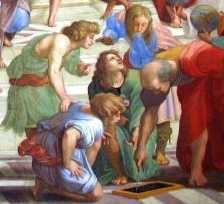Praying this hymn this morning with my previous translation in view, I realized how jumbled and confused my first attempt was. Now that I have a bit of experience and a few more tools, I'd like to try again:
mp3
Christ true Sun, make us sons of the light
Pergráta mundo núntiat
To the beautiful world the dawn announces
auróra solis spícula,
by the light of the dawn sun's ray
res et colóre véstiens
clothing things with color
iam cuncta dat nitéscere.
the dawn now make all things begins to shine
2. Qui sol per ævum praénites,
Thou shinest forth as the sun through the ages
o Christe, nobis vívidus,
O Christ, giving life to us
ad te canéntes vértimur,
we are turned to Thee chanting praise
te gestiéntes pérfrui.
eagerly exulting to enjoy Thee.
3. Tu Patris es sciéntia
Thou art knowledge of the Father
Verbúmque per quod ómnia
and the Word by which all things
miro refúlgent órdine
shine with wonderful order
mentésque nostras áttrahunt.
and attract our minds towards Thee.
4. Da lucis ut nos fílii
Make us sons of light that
sic ambulémus ímpigri,
we may walk with eagerness
ut Patris usque grátiam
that always the grace of the Father
mores et actus éxprimant.
our habits and actions may express.
5. Sincéra præsta ut prófluant
Grant that pure things may emanate
ex ore nostro iúgiter,
from our mouth continually,
et veritátis dúlcibus
and by the joys of delightful truth
ut excitémur gáudiis.
grant that we may be awakened.
6. Sit, Christe, rex piísime,
Christ, most loving King
tibi Patríque glória
to you and to the Father be glory
cum Spíritu Paráclito,
with the Spirit Paraclete
in sempitérna saécula. Amen.
unto endless ages.
This hymn is modern, written by the editor of the Liber Hymnarius, Dom Anselmo Lentini, of Monte Cassino, to whom I constantly refer in this blog.
The First Mass of Christmas: Missa in Nocte (MR1962)
-
Christmas begins in darkness. Holy Church gathers while the rest of the
world sleeps, and in that deep quiet she announces that the eternal Light
has enter...
11 hours ago

1 comment:
Pergrata does not modify mundo; it modifies either aurora or spicula. Spicula is a neuter plural in the accusative, so "Pergrata mundo nuntiat / aurora solis spicula" means "Dawn announces to the world the very pleasing arrows of the sun".
The imagery is actually somewhat pagan, since the sun-god Apollo was known as an archer. But verse 2 adopts this imagery for Christ, explicitly. "Thou art the sun, who shinest forth forever, for us thou art teeming with life, O Christ." Where the arrows of Apollo brought plague, those of Christ the sun bring life.
Verse 4 says "Grant that we suns of light may walk with such eagerness that our habits and actions may model even the grace of the father".
In verse 5, dulcibus modifies gaudiis, "sweet joys".
Post a Comment